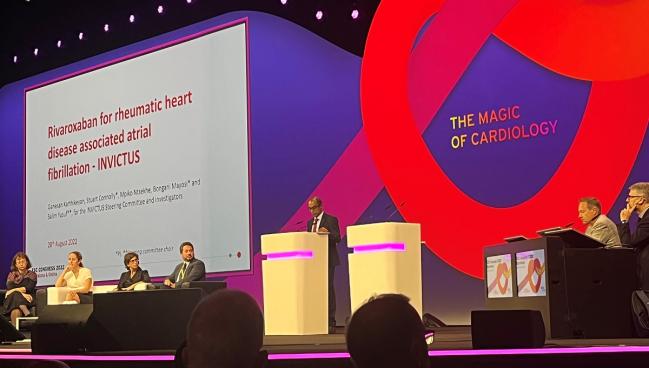INVICTUS: More Deaths, Stroke With Rivaroxaban in Rheumatic Heart Disease AF
Investigators were “floored by the results,” and can’t understand why the DOAC was linked with higher mortality.

BARCELONA, Spain—(UPDATED) In patients with atrial fibrillation (AF) caused by rheumatic heart disease, a group excluded from contemporary stroke prevention trials of direct oral anticoagulants (DOACs), use of rivaroxaban was associated with a higher risk of major cardiovascular events compared with vitamin K antagonist (VKA) therapy, the randomized INVICTUS study shows.
Rivaroxaban (Xarelto; Bayer/Janssen) increased the risk of stroke, systemic embolism, MI, or death from vascular or unknown causes—the primary efficacy outcome—by 25% when compared with VKA therapy, a difference that was driven by more deaths and ischemic strokes in the rivaroxaban-treated patients.
There was no difference in the risk of major bleeding between the two treatment approaches.
The findings, which were presented here during a Hot Line session at the European Society of Cardiology (ESC) Congress 2022 and published simultaneously in the New England Journal of Medicine, appeared to throw investigators for a loop, particularly since it was hoped the factor Xa inhibitor might be more easily used in low- and middle-income countries, where rheumatic heart disease is more common.
Salim Yusuf, MBBS, DPhil (McMaster University/Population Health Research Institute, Hamilton, Canada), who chaired the INVICTUS steering committee, said he was “absolutely floored by the results.”
“In poorer countries—in fact, in most countries—regular INR monitoring is actually cumbersome,” Yusuf told TCTMD. “In many parts of the world, such as in Africa, people have to travel extensive distances to get it worked out. It’s a matter of convenience and we thought that the newer agents would be of great value. We were totally surprised, absolutely surprised at the results. We did not anticipate this at all.”
We were totally surprised, absolutely surprised at the results. We did not anticipate this at all. Salim Yusuf
Ganesan Karthikeyan, MD (All India Institute of Medical Sciences, New Delhi), who presented the results during a press conference, told TCTMD that while the results were surprising, there is a good news story here, too. “Vitamin K antagonists are very inexpensive, and they’re widely available in developing countries,” he said. “This trial will show the way in terms of improving INR control in these patients in order to improve outcomes. This is the first time in patients with rheumatic heart disease we’ve actually shown that the drugs reduce hard outcomes.”
Given the findings, Karthikeyan emphasized that “vitamin K antagonists should remain the standard of care for the treatment of rheumatic atrial fibrillation.”
Renato Lopes, MD (Duke Clinical Research Institute, Durham, NC), the discussant following the Hot Line presentation, praised the researchers for performing a study in an area with little data. In valvular heart disease, both the US and European guidelines have very few recommendations based on multiple randomized trials (level of evidence A), he said. Like others, though, he expressed shock at the results.
“Who could have possibly guessed these results? Certainly not me,” he said. “It’s a classic example of why we need and do randomized trials, since they are the only reliable way to determine treatment effects and drive clinical practice.”
Like Karthikeyan, Lopes stressed that VKA therapy should continue to be the go-to treatment for patients with rheumatic heart disease-associated AF.
Not Enough Patients in Therapeutic Range
In randomized trials of nonvalvular AF, DOACs proved as effective as warfarin while carrying a lower risk of intracranial hemorrhage. In the ROCKET AF trial, for example, rivaroxaban was shown to be noninferior to warfarin for the prevention of stroke or systemic embolism, with no difference in the risk of major bleeding between the two treatments. Rivaroxaban was associated with less intracranial and fatal bleeding, however.
But ROCKET AF, like other DOAC stroke prevention trials, excluded patients with AF due to rheumatic heart disease. Patients with AF attributable to rheumatic heart disease differ from those with nonvalvular AF in that they are younger and more often female and frequently have advanced valvular disease, particularly mitral valve stenosis. As Yusuf noted, checking anticoagulation status with warfarin can be difficult in countries where regular access to health services is challenging.
“Rheumatic heart disease is an orphan disease, for all practical purposes,” added Karthikeyan. “It affects 40 million around the world, but most of these patients are in low- and middle-income countries. About 20% of those patients . . . who present with symptomatic disease have atrial fibrillation and an elevated risk of stroke. However, the early anticoagulation trials done in North America and Europe excluded these patients with rheumatic heart disease because at that time it was considered that these people were at a high risk of stroke and it was unethical to randomize them.”
Only roughly half of patients with rheumatic heart disease-associated AF are treated with VKAs. For those that are treated, just one-third are treated successfully with an INR in therapeutic range, said Karthikeyan.
The INVICTUS study enrolled 4,565 patients (mean age 50.5 years; 72.3% women) from 24 countries with proven rheumatic heart disease and documented AF/atrial flutter. To be included in the trial, patients also had to have one of the following criteria: CHA2DS2-VASc score of at least 2, mitral stenosis with a mitral-valve area < 2.0 cm2, or echocardiographic evidence of left atrial spontaneous echo contrast or left atrial thrombus. In total, 85% of patients had mitral valve stenosis, the majority classified as moderate to severe.
For the primary outcome of stroke, systemic embolism, MI, or death from vascular or unknown causes, there were 560 events in the rivaroxaban-treated patients and 446 events in those treated with a VKA (HR 1.25; 95% CI 1.10-1.41). In terms of individual components of the primary endpoint, rivaroxaban increased risk of death by 23% and risk of stroke by 37%. There were no differences in the risk of major, fatal, life-threatening, or clinically relevant nonmajor bleeding, or in the risk of intracranial hemorrhage.
Intention-to-Treat Analysis With Total Numbers of Efficacy Outcomes
|
|
Rivaroxaban |
Vitamin K Antagonist |
HR (95% CI) |
|
Primary Endpoint* |
560 |
446 |
1.25 (1.10-1.41) |
|
Stroke Overall Ischemic Hemorrhagic |
90 74 7 |
65 48 7 |
1.37 (1.00-1.89) 1.53 (1.06-2.20) 1.00 (0.35-2.86) |
|
Systemic Embolism |
6 |
10 |
0.59 (0.22-1.63) |
|
MI |
5 |
3 |
1.67 (0.40-6.97) |
|
Death Overall Vascular Unknown |
552 439 67 |
442 337 69 |
1.23 (1.09-1.40) 1.29 (1.12-1.49) 0.96 (0.69-1.35) |
*Stroke, systemic embolism, MI, or death from vascular or unknown causes
Drug discontinuation was more common in patients treated with rivaroxaban, with 23% stopping the medication prior to study’s completion compared with 6% of patients treated with VKA therapy.
VKA therapy was used in 52.8% of patients prior to the start of INVICTUS. Of these, the INR recorded prior to starting the trial was in the therapeutic range in just 33.2% of patients. After enrollment, the INR recorded in patients in the VKA group during trial visits was 56.1% at 6 months, 59.0% at 1 year, 65.3% at 2 years, 65.1% at 3 years, and 64.1% at 4 years. Karthikeyan said these results are heartening in that it shows good INR control can be achieved in patients with rheumatic heart disease-associated AF.
Kalyanam Shivkumar, MD (UCLA Health, Los Angeles, CA), pointed out that rheumatic AF has always been considered a higher-risk condition, noting there is even mechanistic data showing elevated markers of coagulation when patients are in normal sinus rhythm.
“There’s always been a biological signal that patients with rheumatic AF are a different subset of patients,” he told TCTMD.
Like Karthikeyan, Shivkumar said that INVICTUS, while surprising, is relatively good news because rivaroxaban is a much more expensive anticoagulant than warfarin, which is important given the parts of the world hardest hit by rheumatic heart disease.
“The downside of this is that monitoring is a challenge,” said Shivkumar. “It’s a double-edged sword. It’s an inexpensive drug, but the practitioner needs to factor in the effort it takes to monitor it.” Keeping patients in therapeutic range, he added, can be challenging initially, but if patients are compliant, it can be achieved.
“This study is a win for global health yet again demonstrating the value of well conducted clinical trials, yet somewhat sobering as it shows we still have ways to go as rheumatic heart disease can and should untimely be prevented," he said.
Puzzled by the Mortality Finding
Investigators say they are at a loss to explain why rivaroxaban failed to provide the same type of treatment effect seen in nonvalvular AF. Karthikeyan noted that while mortality was higher with rivaroxaban, this excess risk was not attributable to differences in major or fatal bleeding. The risk of ischemic stroke was also higher with rivaroxaban, but that excess risk is insufficient to explain the higher mortality rate.
Vitamin K antagonists should remain the standard of care for the treatment of rheumatic atrial fibrillation. Ganesan Karthikeyan
“We can only speculate as to what the difference in mortality is,” said Karthikeyan. “Suffice to say, it’s a very interesting result and it will lead to future trials which may lead to simple therapies already available to improve outcomes in these patients.”
Yusuf also remains puzzled. “It just wasn’t anticipated—these trials throw surprises, but the results are robust,” he told TCTMD. There is no evidence that rivaroxaban increases the risk of death in other heart conditions, he said, noting that researchers are continuing to analyze the data.
In an editorial, Gregory Y.H. Lip, MD (University of Liverpool, England), notes, just as the researchers did, that the VKA-treated patients had more frequent interactions with physicians, which could have resulted in better overall care and fewer strokes and deaths. However, he says the take-home message is that maybe these AF patients have a variety of ailments, and while stroke prevention is one of the pillars of their care, residual events are more common despite anticoagulation. Like Karthikeyan, Lip said VKA therapy should remain the standard of care for patients with AF associated with rheumatic heart disease.
“Nonetheless, to have a major effect on clinical outcomes, holistic treatment of patients with rheumatic heart disease-associated atrial fibrillation is needed in integrated care-management pathways that look beyond anticoagulation alone,” writes Lip.
Michael O’Riordan is the Managing Editor for TCTMD. He completed his undergraduate degrees at Queen’s University in Kingston, ON, and…
Read Full BioSources
Connolly SJ, Karthikeyan G, Ntsekhe M, et al. Rivaroxaban in rheumatic heart disease-associated atrial fibrillation. N Engl J Med. 2022;Epub ahead of print.
Lip GYH. Anticoagulation in atrial fibrillation and rheumatic heart disease. N Engl J Med. 2022;Epub ahead of print.
Disclosures
- Connolly reports consulting for Bayer, Bristol Myers Squibb, Sankyo, and Javelin Ventures.
- Yusuf reports institutional grant support from Bayer.
- Lip reports consulting for Boehringer Ingelheim, Bristol Myers Squibb, Daiichi Sankyo, and Pfizer.





Viraj Suvarna